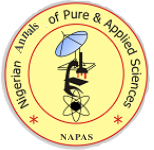Editorial Comments Vol 6 No 1 (2023)
The Reality of Women in Science
I am the second daughter of my parents to graduate from the university with a degree in a science programme. After me, four other sisters graduated with science degrees and only one with a degree in law. My parents were secondary teachers. I learnt from them that training a girl child implies the education of a nation. This is also a common saying in Nigeria.
Having practiced teaching and researching at the university with over 23 years of experience, I have become increasingly disheartened by the level of societal, cultural, and workplace challenges that women encounter while training and practicing in the scientific eco-system, especially in the African context, where women have demonstrated to have played a pivotal role in the progress and sustainability of the
world. This can only be possible if they are empowered through education and employment opportunities in science, technology, and innovation.
The empowerment of women is one of the challenges we must purposefully embrace for sustainable development. Many countries are able to reach gender parity at lower levels of education, but there seem to be obvious gender gaps that exist at higher levels of education. While we are recording an increase in the number of women graduating from universities with higher degrees, women scientists underrepresentation is still common and frightening in science, technology, engineering, and mathematics (STEM). There is a common slogan that says, ‘What a man can do, a woman can do better.” This slogan has proved true in many aspects of life. We all know that science is the systematic study of the physical and natural world through observation, experimentation, and testing of theories against the evidence obtained. This can be seen within the context of the story of Adam and Eve in the Garden of Eden. We were told that Eve, when tempted by the devil, tasted the apple (experimentation) and her eyes opened (testing of theories against evidence obtained), and she proceeded to share with Adam (invention). Though this story is in the negative, it goes to show that women have been involved in scientific discoveries since the Stone Age. So many factors are responsible for the slow growth rate of women in the scientific profession, including gender disparities in employment, promotions, seniorship,
appointments, funding opportunities, and even in publications. Other gender issues in STEM are social, cultural, and institutional. Fewer role models, hence fewer female mentors for girls, and limited mentoring opportunities. Stress caused by workloads both at home and at work, often due to inequity in domestic chores with partners, affects her commitment to work and hence her promotion and growth in the workplace. Political marginalisation of female workers and rigid gender norms and stereotypes
often undermine women’s physical and intellectual capabilities.
I believe that most of these challenges that confront women in science can be addressed by more women-friendly workplace policies, a change in organisational behaviour, adhering to International Labour Organisation (ILO) laws on gender equality, and mainstreaming policies. I also want to encourage women to understand that there are huge prospects or benefits when female scientists engage themselves in networking by improving their visibility, attending capacity-building workshops, being members of professional associations, attending conferences, and collaborating effectively. By eliminating this gender gap in STEM and supporting the education of women, we can assist economic growth and development in Africa.
The Editorial Board of the Nigerian Annals of Pure and Applied Sciences (NAPAS) has dedicated the two volumes to be published in 2024 to celebrate achievements of women in science. We will be subsidizing publication processes for scholarly articles submitted by women. We hope that this will increase the interest NAPAS and encourage greater women participation scientific publications.
Prof. Ogbene Igbum,
Professor of Polymer and Biofuel Chemistry
Benue State University, Makurdi


 Contact Us
Contact Us Editorial Team
Editorial Team Join As A Reviewer
Join As A Reviewer  Request For Print Copy
Request For Print Copy


 Cprint Publishers
Cprint Publishers